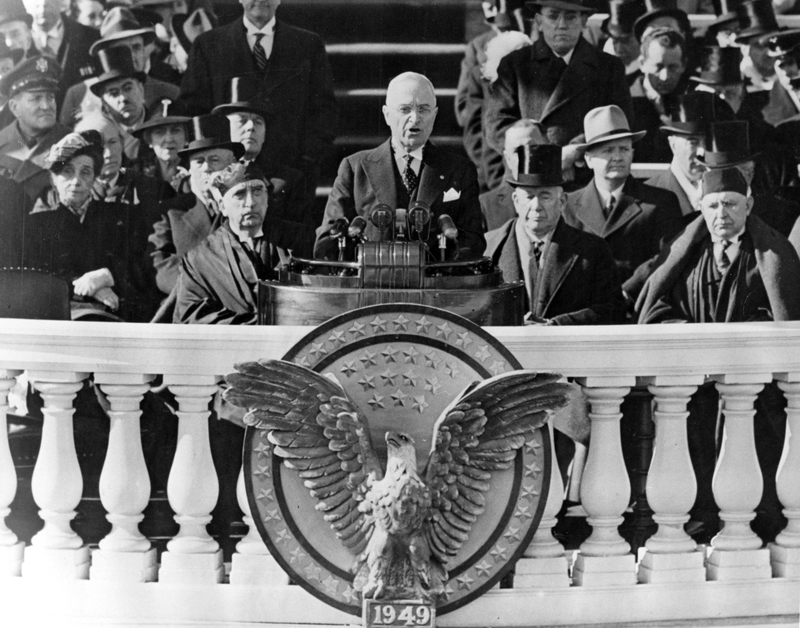In his inaugural Cold War address, President Harry Truman proclaimed that “the United States and other like-minded nations find themselves directly opposed by a regime with contrary aims and a totally different concept of life…[Authoritarianism] is based on the belief that man is so weak and inadequate that he is unable to govern himself, and therefore requires the rule of strong masters. Democracy is based on the conviction that man has the moral and intellectual capacity, as well as the inalienable right, to govern himself with reason and justice.” Today, authoritarianism has found a global foothold again, and democracy, sacrificed so greatly for, is under threat—yes, we are in the early days of a cold war.
Competition for primacy between the United States, Russia, and the Chinese Communist Party (CCP) is straining conventional security dilemmas. Scholars of great power competition presuppose these challenges are for rational-seeking security. This assumption is half wrong to a fault. If China and the United States only seek rational security, then why are two nuclear powers engaging in such risky brinksmanship over Taiwan? Why would Russia invade Ukraine when Vladimir Putin knew the West would come to her aide, entrapping Putin’s army in protracted warfare? Because what’s at stake is bigger than material power. What’s at stake is a shared conception of the world we all participate in creating.
Political scientists often debate how and to what extent opposing concepts like ideas and material interests affect state behavior. Presently, the United States and her partners are acting on those material interests by deterring offensive conduct exhibited by Russia and the CCP. The U.S. and her allies are attempting to deliver on their word that cooperation and rules of conduct among states facilitated by the Liberal International Order (LIO) works. Now, the U.S. must reactivate Truman’s programmatic support policies, like the Marshall Plan, by instrumentalizing America’s values proposition through foreign policy: the world is better off with U.S. investments and common defense against tyranny.
Like the end of the Cold War, this modern chapter of great power competition will close when authoritarian regimes that try and engineer society in their own image come into closer ideational alignment with the LIO. The question of our time is whether they will, and to what degree these powers will transform. Will China, Russia, and other dictatorial regimes reform to adopt a more liberal conception of governance and international conduct? Or will the United States compromise democracy and the rule of law–priceless interests—to resemble the identity of its rivals? Unfortunately, the outcome seems to be finding itself somewhere in the middle; a dialectic turn that will never satisfy the ideational appetites of free peoples around the world. This is where we find ourselves now. Not merely in a categorical competition for technological and economic power, but a paradigmatic shift for ontological security—the severity of security dilemmas between great powers are largely being regulated by ideas.
This is why the great power competition of our time feels so chaotic and intense. During a cold war, psychological struggles predominate the social landscape, and cultural and governance norms are far more messy, more emotional, and more irrational than rational security dilemmas. Why has the world experienced a reversion to nationalism? Because what’s at stake is not just the preservation of a territorial homeland, but each nation’s “way” of life. Suppression of the global spread of China and Russia’s authoritarian models, in as much as the U.S. can, rests in her ability to win the psychological contest—to achieve ideational victory. To do so, the U.S. is continuing to instrumentalize grievances over human rights conduct and condemn China and Russia’s ambitions as predatorial and unreliable. Now America needs to further promote its values through foreign policy beyond Ukraine, invest in the world, protect the vulnerable, and give other nations a clear vision; a real opportunity to succeed with America’s help. Securing liberty and justice, and creating peace comes at a cost and requires credibility.
To this end, the U.S. government should strive for perfection and live up to its own standards of conduct. The American people need their elected officials to restore some degree of honor to the practice of politics. Most Americans know honorable politics when we see it and citizens follow the examples available to them. What American citizens are witnessing in their domestic politics just isn’t cutting it. The success of a great power today rests in its capacity to be loved more than feared. Fear will work to dissuade opposition in the short run, but sympathy and common values with a great power can deliver sustained legitimacy and with it, long-term global security, stability, and prosperity. The competition the U.S. confronts is for hearts and minds, not just bullets and butter.
Joshua Stone is a Political Science Ph.D. student majoring in International Relations with the Schar School of Policy and Government. He is a U.S.-China relations specialist, a father of two, a combat veteran of the United States Army, and an aspiring professor. His research takes aim at material and psychological regulators of the security dilemma and spiral model. Specifically, he examines the effects of state integration and ideology on the severity of a security dilemma between rival states and their impact during offensive conditions in spiraling relations. He holds a B.A. in Political Science and History in U.S.-China Relations from the University of California, Berkeley and an M.P.P. in Chinese Political and Economic Affairs from the University of California, Irvine.
Photo can be found here.




